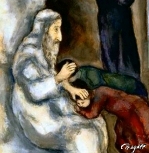|
When Joseph tried to correct his father regarding which of his two sons was the firstborn, he said: יָדַעְתִּי בְנִי יָדַעְתִּי - "I know my son, I know" (Gen. 48:19). Jacob's "incongruous" blessing of Ephraim and Manasseh was intended to serve as a parable to warn of the dangers of fraternal envy. The blessing of God is for the whole family, regardless of whoever may be regarded as "the favored son" (or favored daughter, for that matter). And since both Ephraim and Manasseh had accepted God's will without protest, Jacob ordained that these two brothers should serve as examples for all Israel to follow. Therefore Jacob blessed them that day, and carefully added, "By you Israel will pronounce blessings, saying, יְשִׂמְךָ אֱלהִים כְּאֶפְרַיִם וְכִמְנַשֶּׁה - yesimkha Elohim ke'efraim ve'khimnasheh: 'May God make you like Ephraim and as Manasseh'" (Gen. 48:20) -- a phrase that has been incorporated into our Sabbath blessings. "The first shall be last and the last shall be first," but regarding the love and blessing of God, this makes no difference....
Hebrew Lesson
Genesis 49:20b reading (click):
 |
|



